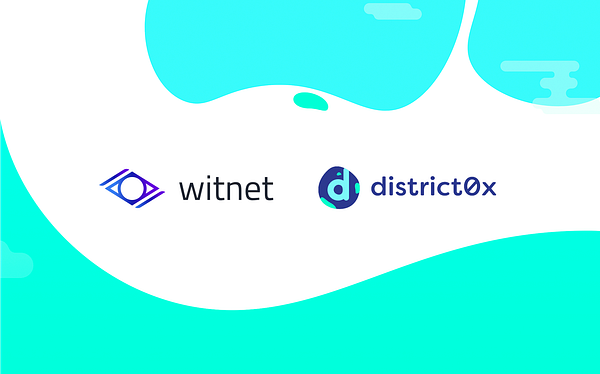Making P2P marketplaces trustless
The holy grail of smart contracts and e-commerce, finally made possible

Why you need a peer-to-peer marketplace at all
A peer-to-peer marketplace is a market where sellers and buyers trade without intermediaries.
One of the largest communities and most exciting projects working towards enabling p2p marketplaces is district0x , a network of decentralized markets created, operated, and governed on top of Ethereum and Aragon . These kind of marketplaces leverage one of the more famous blockchain axioms: removing intermediaries reduces costs and facilitates free trade . But it also introduces a large degree of counterparty risk . One of the parties in the trade can lose money if the other doesn’t live up to their contractual obligations. If Alice pays Bob for some merchandise but she never receives it, she loses it all. She can’t enforce a penalty on Bob, who gets away with his fraud. Alice will prefer to pay only after she receives the merchandise. But that’s even riskier for Bob, especially when trading physical goods . If Bob sends the merchandise upfront, he needs some way to enforce payment upon delivery. This is why marketplaces exist in the first place. They act as trusted arbiters providing escrow and insurance services at a cost. They remove risk from trade and enforce penalties on misbehaving actors. Marketplaces also play an important role as “merchant rating agencies”. Customers’ comments and ratings are a crowdsourced assessment of each seller’s honesty. These reputation metrics incentivice merchants to remain honest in the long term. But they aren’t effective against exit scams . Merchants can become corrupt at any time. They can deceive a few customers before their reputation is significantly damaged. In peer-to-peer marketplaces, there is no intermediary to assume the economic impact of exit scams. Counterparty risk is unavoidable. Or is it?
Smart contracts as decentralized escrows for peer-to-peer marketplaces
Escrows are independent trusted entities acting as custodians for funds in a trade. They release those funds depending on conditions agreed upon by the transacting parties.
Smart contracts are the perfect way to automatize escrows. They remove the need for trust from the equation. As long as their code is faithful to the agreed conditions, no deception is possible. Escrows are indeed one of the most popular use cases for smart contracts. But the problem comes when physical goods enter the formula. Current blockchain technology won’t allow you to create smart contracts that can check the delivery status of a parcel in order to decide whether the funds in a escrow should be released or refunded. This is the ugly truth about smart contracts’ state of the art: smart contracts are still completely isolated from the rest of the world. They have no means to retrieve information from websites and APIs in a trustless way.
Relying on a single trusted party to feed external information into your smart contract completely defeats the point of using a smart contract in the first place.
Decentralized escrows on distric0x
This is where Witnet comes into play. Witnet is a decentralized oracle network . It allows smart contracts to read information from websites and APIs. Using Witnet, the district0x communities —the districts — can finally build the holy grail of e-commerce : decentralized Amazon-like marketplaces for physical goods. In these marketplaces, customers will send their payments to the underpinning smart contracts, which will act as a trustless escrow service. These contracts will then use Witnet to interact with the courier company’s API and check the delivery status of the parcel . As soon as the parcel is delivered, the funds will be released to the merchant. If on the contrary the parcel isn’t delivered before an agreed deadline, the funds will be refunded to the customer immediately.
Cross-chain payments for district0x marketplaces
Decentralized applications are currently limited by their inability to allow for payments in a variety of currencies. While a broad ecosystem of tokens has already been deployed on the Ethereum network in the form of ERC-20 tokens , there are hundreds of other blockchains whose native assets can not be easily integrated for payments in a decentralized marketplace built on Ethereum at present. Witnet will change this, making it possible for blockchains to interoperate with one another. Witnet will give a smart contract on the Ethereum blockchain the ability to check a transaction on other blockchains, granting smart contracts the ability to verify payment on a separate platform and to act accordingly once completed. By leveraging Witnet, users will be able to purchase goods from markets deployed on the district0x Network with Bitcoin, Ethereum, or virtually any other cryptocurrency of their choosing. Here’s more info on how Witnet enables cross-chain operations :
The endgame
These decentralized and cross-chain ecosystems powered by Witnet will offer the possibility for the participants in district0x districts to share and govern their own marketplaces not focusing merely on consumption but rather on peer-to-peer production and active participation . Projects like Aragon will be the cornerstone of how those markets will govern themselves . The Witnet team is also working side by side with the Aragon team to make the Aragon Network work across different chains . A new decentralized economy is being born, and the Witnet team is proud to be building one of its key building blocks . Want to be part of this revolution? Join us, we are hiring!
( I’d like to thank Joe Urgo from the district0x team for his contributions to this post. )
Want to know more about the use cases of Witnet?
Don’t miss the next article in the series: You can also:
- Kauri original title: Making P2P marketplaces trustless
- Kauri original link: https://kauri.io/making-p2p-marketplaces-trustless/c9b3cc69bec243b085255c65120b9f8b/a
- Kauri original author: Witnet (@witnet)
- Kauri original Publication date: 2018-11-15
- Kauri original tags: none
- Kauri original hash: QmSWYV46nMsip2vVt8DAVKPR1UgBCfnzvFnc9v7Jd4xEor
- Kauri original checkpoint: QmRS3wCLX2MRi62bg9NTM89qNkgm3XjpKXciLvCKAr1f1g